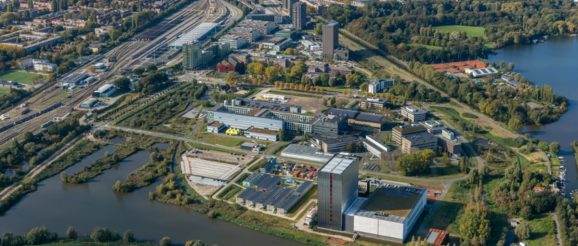Amsterdam joins Rabobank and two Dutch universities to invest in innovation buildings on its campuses

Recently, the University of Amsterdam (UvA), the Municipality of Amsterdam, Rabobank Amsterdam, and the VU University Amsterdam (VU) came together and announced their plan to invest €300M to €400M over the next ten years to develop new innovation centres for knowledge-intensive companies in Amsterdam.
The move brings research, education, talent, and entrepreneurship together under one roof. Subsequently, these ‘Innovation Centres’ will act as optimal locations for knowledge exchange and co-creation of scientific knowledge.
Matrix Innovation Center
The UvA, Rabobank, the Municipality of Amsterdam, and the Netherlands Organisation for Scientific Research (NWO) have been investing together for more than 30 years in innovative industrial buildings at the Amsterdam Science Park.
Together, they founded a real estate company, Matrix Innovation Center NV (Matrix), in 1989.
At present, Matrix has six innovation centres at the Amsterdam Science Park with hundreds of scientific companies, from startups and scale-ups to spin-ins of larger companies.
The seventh Matrix Innovation Center – Matrix ONE, will be opened this fall.
According to UvA, the Matrix ONE will be one of the most sustainable buildings in Amsterdam. The soon-to-be-opened innovation centre will have Sustainalab, a place for companies, scientists, and young talent with a focus on sustainable innovation.
VU partnership with Matrix
On May 10, the VU signed a partnership with Matrix to develop an innovation centre on its own VU Campus (Kenniskwartier Zuidas/Innovation District Zuidas), especially for startups and scale-ups in MedTech and Life Science.
“The entry of the VU as a partner in Matrix offers an excellent opportunity to roll out Matrix’s proven success formula as a catalyst for knowledge-driven innovation, also outside the Amsterdam Science Park’, says Ivo Sweep, Managing Director of Matrix.
“Matrix’s ambition is to have built twelve Innovation Centers on at least four different scientific campuses in Amsterdam by 2032, which means doubling the number of Matrix buildings compared to today. ‘That is an enormous boost in the knowledge-intensive business climate in Amsterdam and thus a further strengthening of the innovative strength of Amsterdam, the metropolitan region, and the whole of the Netherlands,’ says Sweep.
